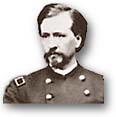
|

|
|
Vol. II, page 298
At fifteen, determined upon getting an education, he stole away from home, equipped with a bundle of clothing, forty-six dollars, and copies of Thaddeus of Warsaw and the Lady of Lyons, and walked about one hundred miles to Chester Academy. Admitted to the school, he remained for two or three years, when he entered the Ohio State National Law School, from which he graduated in 1859. In the same year he began the practice of law at Warren. On the outbreak of the Civil War he became active in support of the Union. At one of these meetings he was challenged by a man in the audience with the question, "Why don't you enlist?" "I will," he promptly replied. He at once volunteered in Company C of the 2nd Ohio Cavalry, of which he was chosen captain on August 23. With his regiment he was sent to Missouri and saw service in the actions at Carthage (near Joplin in the southwest of the state) *, Fort Wayne, and Gibson, later taking part in the campaigns in Southern Kentucky. In the fall of 1863, with the rank of major, he was appointed judge-advocate of the Department of the Ohio. A year later at Governor Morton's request, he was sent to Indiana to prosecute members of the Knights of the Golden Circle and later took part in the cases growing out of the Chicago conspiracy to liberate the Confederate prisoners at Camp Douglas. In these trials, he obtained seven convictions. He was also prominent in the trial of L.P. Milligan for treason before a military commission. He was brevetted a colonel of volunteers March 8, 1865, and in the omnibus promotions of March 13 was brevetted a brigadier-general. In the prosecution of the assassins of Lincoln he served under Judge-Advocate Joseph Holt with General John A. Bingham as a special assistant, and seems to have borne a major part of the preparation of the evidence. [A paper which he wrote on this topic was given as a talk at the Goshen Presbyterian Church and is preserved at the Goshen NY Library and Historical Society.]
 After the trials he moved to Cincinnati, where he practiced law with Judge T.W. Bartley until 1869, and then with Ex-Governors J.D. Cox and John F. Follett until 1872.
Probably his greatest case was that of the Rutland Railroad Company against John B. Page: in the closing argument he spoke for sixteen hours with a "consummate ability" that stamped him "the peer of the greatest advocate of the age" (D. McAdam and others, Bench and Bar of New York, 1899, II, 64). He was an organization Republican, a participant in the party councils, and was on especially close terms with McKinley who used to call him "Lightning Eyes Burnett." In January 1898 McKinley appointed him federal district attorney for the southern district of New York, and on the completion of his four-year term he was reappointed by Roosevelt.
Burnett married three times.
His first wife was Grace (Kitty) Hoffmann died about age 26:
his second, Sarah Lansing died age 29:
His last wife was Agnes Suffern Tailer, of a prominent New York family, who survived him. In his later years he spent much of his time at his country home, Hillside Farm, Goshen, NY, where he kept a large stable of harness horses which he drove on the track of the Goshen Driving Club. In the middle of November 1915, while at the farm, he was taken ill with pneumonia. Despite his serious condition he insisted on being taken by train to his city home, where, two months later, he died. [He was buried in Goshen, NY.] (Burnett's article, "Assassination of President Lincoln and the Trial of the Assassins," in History of the Ohio Society of New York (1906); David Miller DeWitt, The Assassination of Abraham Lincoln (1909); The Conspiracy Trial (3 volumes, 1865-1866), ed. by Benj. Perley Poor; Official Records (Army); Who's Who in America, 1912-13; obituaries in the New York Times and New York Tribune, January 5, 1916.) |


|
NJ Governor Lewis Morris |
 Breese Family |
 Night Before Xmas Henry Livingston |
 President George Bush |
 Father Bradley Van Deusen |
 Mother Jean Van Deusen |
 Home |
 Suggested Favorite Pages |
 Site Map |
 Copyright © 1998, Mary S. Van Deusen
Copyright © 1998, Mary S. Van Deusen
|